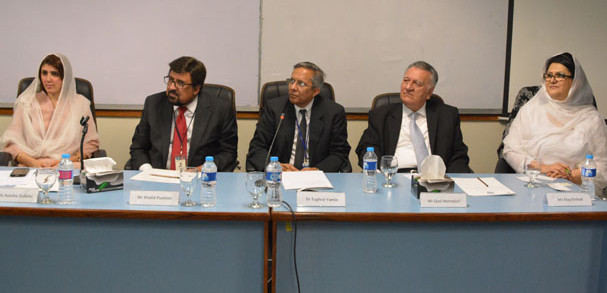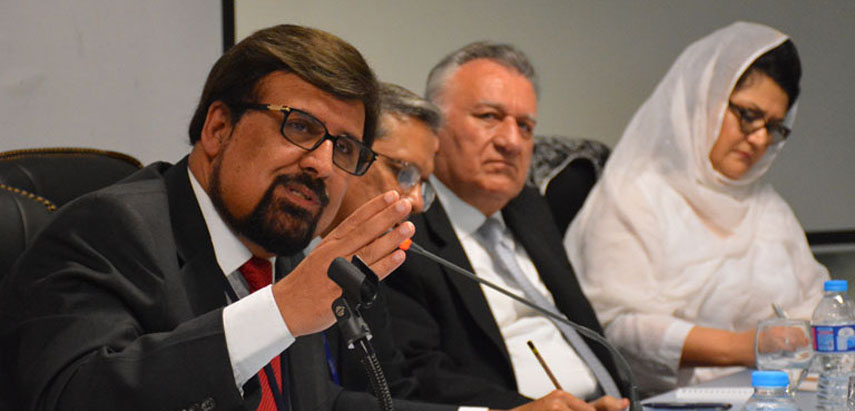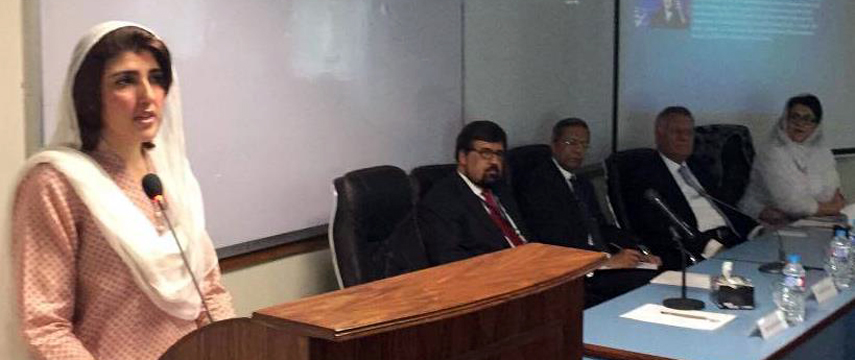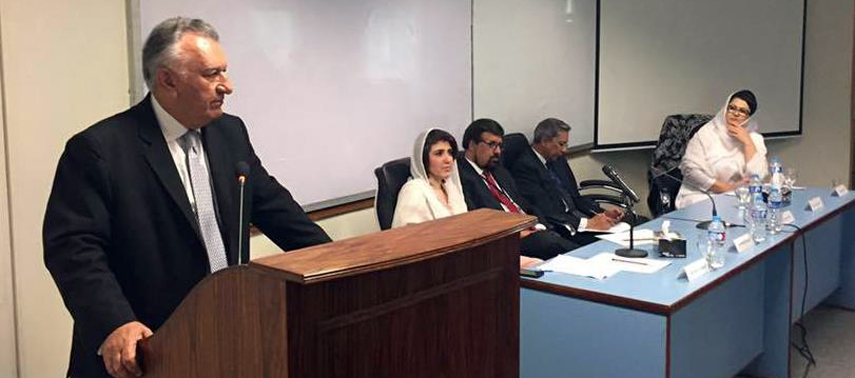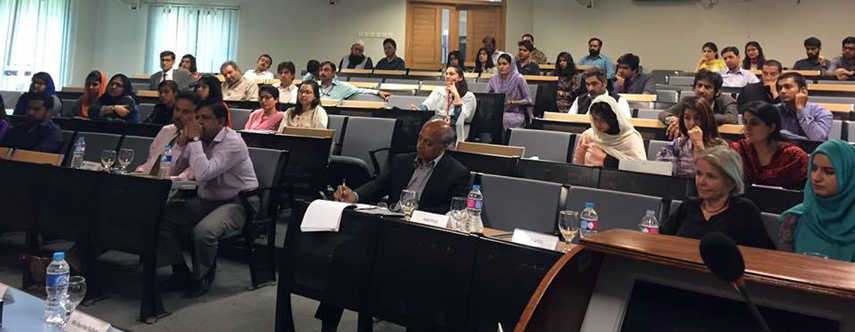During the sixth meeting of the Pakistan Afghanistan Joint Committee held in Islamabad, as part of outreach and university interaction planned for the group, two members each from the PAJC also visited the National University of Science & Technology (NUST) on Wednesday, March 29, 2017. The Pakistani speakers were Mr. Qazi Humayun, former ambassador; and Ayesha Gulalai, Member of National Assembly, while the Afghan speakers were Mr. Khalid Pashtoon and Ms. Elay Ershad, both members of Parliament. The four speakers spoke on the theme, “Pak-Afghan Bilateral Relations: Explaining Perspectives.” The program was arranged in collaboration with the Centre for International Peace & Stability (CIPS) at the NUST Institute of Peace & Conflict Studies (NIPCONS) Department. CRSS Executive Director Mr. Imtiaz Gul represented CRSS.
Dr. Tughral Yamin, the Associate Dean of the Centre for International Peace & Stability (CIPS), welcomed the Pakistan-Afghanistan Joint Committee speakers. Mr. Imtiaz Gul thanked Mr. Tughral Yamin for arranging the forum and provided a brief overview of the project Beyond Boundaries which, he stated, was focused on increasing people to people contacts between Afghanistan and Pakistan. He told the audience that this was the 12th and the last meeting after two years of continued dialogue on the forum of Beyond Boundaries between the two countries. The purpose of these university lectures, he explained, was to reach out to young future leaders and faculty members in both Pakistan and Afghanistan as they are the future multipliers and explain the respective narratives of Afghans and Pakistanis to them.
There were about of 35-40 students and faculty members present in the audience.
The session commenced with short introductions of the distinguished speakers from Afghanistan and Pakistan. Mr. Khalid Pashtoon, Member of Afghan Parliament, stated that he was pleased to be in one of the advanced universities of Pakistan and that the higher number of girls in attendance in the auditorium as compared to boys showed the culture of education in Pakistan. He told the audience that he was here to improve and understand the two brotherly nations.
Ms. Ayesha Gulalai, Member of National Assembly, spoke from Pakistan side. She warmly welcomed the Afghan guest speakers for visiting Pakistan at a time of such tense situation and stated that she had a great meeting when she visited Kabul. She said that the fact that the two governments have failed to have a structured dialogue shows the lack of will in both governments to improve relations with each other. Yet, she said, she was a member of the Parliament from Pakistan and Mr. Khalid Pashtoon, a member of Parliament from Afghanistan, had come together in these meetings to try to do what they can in their capacity for improving the relations between the two neighbors.
She thanked the British Government for arranging the meeting between the two countries’ government representatives on March 15 but expressed her grief over the two countries governments’ inability to sit together to resolve issues themselves despite being two Muslim neighboring countries. She quoted a BBC report which showed that the trade between Pakistan and Afghanistan had dropped from $3bn to just $500m in recent years. She emphasized that there is a need to build trust between the two countries and that while Afghanistan could always use other routes for trade; Pakistan would always remain Afghanistan’s shortest route to the ocean.
Speaking on the issue of terrorism, she stated that Daesh was a common threat to Afghanistan and Pakistan, which was even spreading to India now.
She concluded by saying, “You have a good friend like India but you also have a brother like Pakistan. We have made mistakes in the past. We don’t believe in ‘strategic depth’ anymore.” She also said that the “Durand Line should also be accepted now.” She urged the two governments to immediately engage at the President and Prime Minister level, have their security establishment on their sides, and resolve their differences directly.
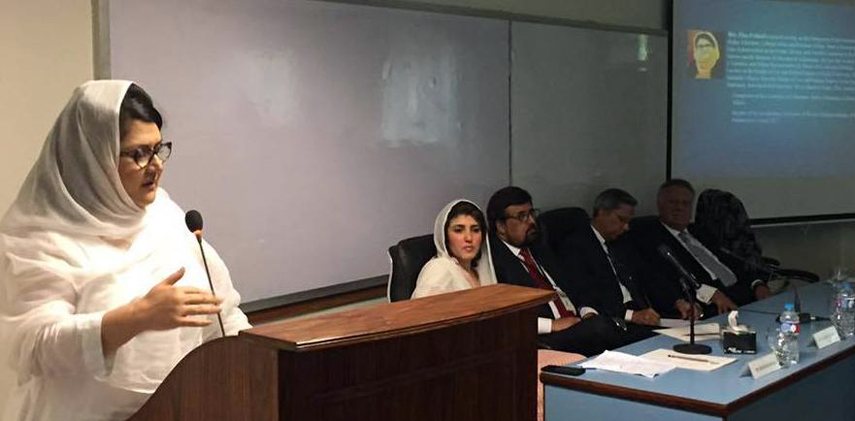 Ms. Elay Ershad, a Member of Afghan Parliament, spoke next from the Afghan side. Speaking of the Durand Line, she stated that when the two countries have the same culture, religion and language, there is no need to discuss the Durand Line but rather talk about the common threats, such as Daesh, and about building a common strategy. She also shared that she learned Urdu from Indian movies and Urdu Ghazals (songs) and ended her speech by reading out an Urdu poem by Allama Iqbal, a Pakistani poet.
Ms. Elay Ershad, a Member of Afghan Parliament, spoke next from the Afghan side. Speaking of the Durand Line, she stated that when the two countries have the same culture, religion and language, there is no need to discuss the Durand Line but rather talk about the common threats, such as Daesh, and about building a common strategy. She also shared that she learned Urdu from Indian movies and Urdu Ghazals (songs) and ended her speech by reading out an Urdu poem by Allama Iqbal, a Pakistani poet.
Mr. Qazi Humayun, a former Ambassador, spoke fourth from the Pakistani side. He thanked the NUST Institute of Peace & Conflict Studies for arranging this interaction with students and faculty members. He stated that while Pakistan and Afghanistan never had a dull moment, they always handle their issues. Both countries are located in a strategic area as a result of which there are continued interests of great powers. He urged the two governments to sit together and resolve their bilateral problems.
The floor was then opened for discussion whereby several questions were raised by students and faculty members. Dr. Tughral Yamin, who was moderating the Questions & Answers session, recalled the days when he was an army man and said that he never considered the Afghans as an enemy. He proposed that the best solution for the border issues between Pakistan and Afghanistan was to establish a school every 10 kilometers along the 2,640 miles long border. He also revealed that there was an offer from his university, the National University of Science & Technology, of 5 fully funded scholarships for Afghan students which was made in 2016 but the Afghans at the time did not take it up. He said there are still five of those vacancies now.
A question raised in the audience by a faculty member and posed to the Afghan members was; “Being an ex-army man, I feel that the only problem between Pakistan and Afghanistan is India. It is not Durand Line or terrorism. What are your views?” Mr. Khalid Pashtoon responded by saying that there were few reasons behind the increased activity of India in Afghanistan, adding that “the Afghans are not very happy about that”. Referring to Ms. Ayesha Gulalai’s comment regarding ‘strategic depth’, he said “the strategic depth created the whole problem even though it is gone now.”
Nevertheless, he went on to say, Pakistan gave the Afghan refugees a shelter, home, food and education and the Afghans will always remember this. The problem, in his view, came from the rise of Taliban who destroyed Kabul which used to be “the capital of civilization”. He also added that “if India is using our land to do terrorism in Pakistan or have a proxy war there, we are not accepting them. Adding to that, Ms. Elay Ershad stated, “We will never let any country, be it India or any other, to misuse our land.”
In response to a question regarding the issue of the illegal trade of drugs in Afghanistan, Ms. Elay Ershad stated that drugs is such a huge problem in Afghanistan that even the Taliban freely use drugs and the Mullahs (religious teachers) do not term it as illegal. “They think it’s kind of an income, so let’s do it,” she said.
Replying to other questions from the audience, Ms. Ayesha Gulalai stated that she was a strong advocate of good ties between Pakistan and Afghanistan. Apart from sheltering the Afghan brothers and sisters in Pakistan for many years and still continuing to host many, she said Pakistan should still reach out to the people of Afghanistan like India is doing. The issues between Pakistan and Afghanistan, she said, should not be resolved through a military solution but through dialogue. While bureaucracy continues to be a hindrance, she proposed that sports was a constructive medium and one of the best solution to the end of Talibanization.
Replying to a question about CPEC, Mr. Khalid Pashtoon said that when Afghans heard about the 48 bn project between China and Pakistan, they were excited that they would also be able to benefit from it now. He said same is the case with TAPI; when it will materialize, everyone will benefit from it. However, what is first required for such development to materialize is friendship and cooperation between the two countries.
Dr. Tughral Yamin, in his concluding remarks, thanked the distinguished PAJC members and stressed on the need for building more bridges between Pakistan and Afghanistan through more people to people contact. As an advice to his Pakistani fellowmen and women, he added “Please treat Afghanistan as a younger brother.”
A university survey was also administered with the participating students and faculty members – post the lectures by PAJC members – to gauge the improvement in their perceptions on the other side; understanding of the challenges of Pak-Afghan relations, and awareness about the socio-political conditions in both countries.

